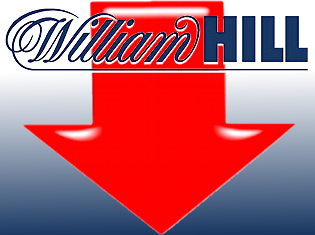 UK bookies William Hill reported a 31% drop in operating profit during the three months ending Oct. 1, according to an interim management statement issued Thursday. Hills blamed the £24m reduction in profit on a soft retail performance during July and a string of punter-favoring sporting results, particularly in football, that pushed gross win margin down 0.8 percentage points at the retail level, while online margin fell 1.5 points. Group revenue rose 10%, or 4% after adjusting for the UK’s new Machine Games Duty that took effect in February.
UK bookies William Hill reported a 31% drop in operating profit during the three months ending Oct. 1, according to an interim management statement issued Thursday. Hills blamed the £24m reduction in profit on a soft retail performance during July and a string of punter-favoring sporting results, particularly in football, that pushed gross win margin down 0.8 percentage points at the retail level, while online margin fell 1.5 points. Group revenue rose 10%, or 4% after adjusting for the UK’s new Machine Games Duty that took effect in February.
Hills’ online revenue fell 2% in Q3, with sportsbook down 1% and gaming down 3%. Combined with 12% higher operating costs, online profit fell 28% year-on-year, although it remains up 1% year-to-date. Sportsbook turnover rose 42%, while mobile turnover was up 115%, accounting for 41% of total sportsbook handle. Mobile also enjoyed a higher margin (7.4%) than the overall margin of 6.3%. Online gaming revenue should have risen 5% but for a £2.5m payday to a single customer in August. Online casino revenue fell 2%, bingo lost 6% and poker dropped 11%. Mobile gaming revenue rose 126%, accounting for 18% of total gaming revenue.
Retail revenue rose 5%, despite a 2% drop in OTC wagers and the reduced win margin. Gaming machines – including the new Eclipse machines now available in 207 Hills’ shops – saw revenue rise 18% despite a £40 drop in win per machine from Q3 2012. Retail profit was down 27% year-on-year and 10% year-to-date. Hills’ telephone wagering channel reported a loss of £1.3m as margins slipped 1.6 percentage points to 5.5%.
In Australia, Hills’ Sportingbet brand generated £2m in profit, thanks to a 17% bump in revenue. The rate of decline in first-time deposits has slowed from 41% last year to 18% in the most recent quarter. William Hill US saw a 47% rise in handle, thanks to strong growth in mobile betting and more in-play betting options. But Hills US revenue fell 32% thanks to a 5.4% win margin, which was less than half the 11.6% recorded in Q3 2012.
While Hills can’t guarantee that Q4’s performance will allow it to compensate for the Q3 swoon, Hills CEO Ralph Topping said it was “important in our business to look through the impact of short-term results on trading.” Topping reported a rise in betting stakes in August and September, giving him “continued confidence in the underlying strength of the business.” Numis analyst Ivor Jones concurred, calling the Q3 dip “a function of the normal ebb and flow of bookmaking margin.” Investors appeared equally convinced, as Hills shares rose 1.7p on Thursday to close at 413p.
In a conference call with analysts, Topping predicted the UK’s looming point of consumption tax (POCT) would allow Hills to gain market share from weaker rivals. Clearly treating the Q3 results as an anomaly, Topping said a company with Hills’ “upwards momentum” was “in as good a place as most” to handle the new tax. While not singling out Ladbrokes by name, Topping said Hills’ intention was to identify already struggling rivals that will likely struggle even more under the POCT burden, then Hills “will shove a hosepipe down and turn the tap on.” Your move, Richard Glynn…
